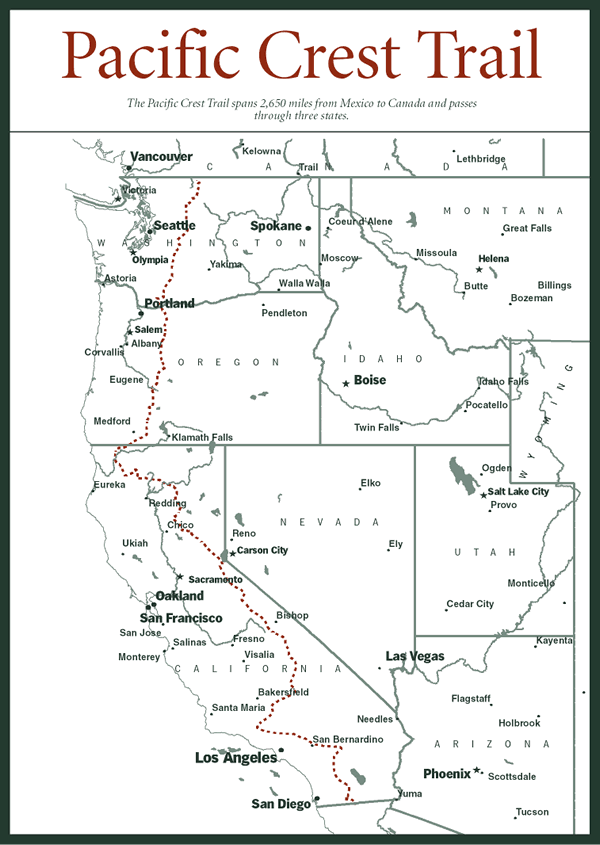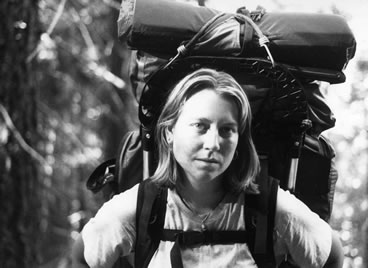Cheryl Strayed at the Texas Book Festival
Edward Porter
Oct 16, 2012
About a year ago, someone named Cheryl Strayed friended me on Facebook. We had a mutual friend, my wife, so I accepted. After that--the deluge. Strayed's Wild, her memoir about her partial through-hike of the Pacific Crest Trail that she undertook in an effort to come to grips with her mother's death, has been one of the most, um, oh God, wildly successful books of the year. I assume she friended my wife (through a mutual pal) and then me before she knew she was going to be famous, and was trying to pick up as much social media oomph as she could. From her Facebook feed, I've been able to follow her quick leaps from pinnacle to pinnacle of success, and on Saturday, at the Texas Book Festival in Austin, I heard her interviewed by Amanda Eyre Ward before an impressive crowd in the state capitol building. I should confess right away that I haven't read Wild, or rather, I haven't read all of it yet. I have, however gone through chunks of it in bookstores, looking for myself in it. I too, hiked the Pacific Crest Trail, or at least a long section of it, and this took place reasonably soon after my mother's death. I'd like to be able to say that the similarity between our experiences made me feel momentarily less alone on this rock hurtling through the void, but a more accurate account of my feelings is that I was pissed off that Strayed had scooped me. Standing at the bestsellers table in Barnes and Noble, I could see that our emotional journeys hadn't been similar, and I didn't find the things in the text I was looking for. Evidently Strayed got off the trail before she reached Washington State, which was the section I'd hiked myself. I'd wanted to know was how she'd negotiated the glacier at Goat Rocks, how she'd been affected by the clearcuts north of the William O. Douglas Wilderness, had she hitched down into Skykomish, etc., etc.. Alas, we hadn't covered the same terrain, physically or metaphorically. I will emphatically vouch though, from the sections I read, that Wild is really, really good, and you should buy it and read it, as I undoubtedly will, once I can get the monkey of finishing this degree off my back. Sitting in the hard wooden chairs of the House Chamber gallery, listening to Strayed at the book festival, I had particular reason to be thinking about the rigors of getting a doctorate. The drive from Houston to Austin had been painful, as have all my travel experiences lately. In my second year of graduate work, I wrote a lengthy bibliographic essay about nineteenth-century American realism that necessitated an ungodly number of hours in my study carrel in the library, sitting on a similarly hard wooden chair, and my ass has never been the same. I used to pride myself on my long-distance driving, and now even a two-hour plane flight gives me pause. The conclusion to my realism essay, by the way, was that there's no such thing as realism, but that's another story. Or maybe it is this story. It's hard to tell. Strayed had a warm, appealing presence, seemed unfazed by her success, spoke with great humor and intelligence, and, in short, made it hard for me to stay annoyed with her, although I tried. She put me in my place right away, pointing out that the adventure itself is nothing--lots of other people have hiked the PCT, or experienced tragic grief. What made her different was her ability to write about it, to find a meaning in her experiences worth articulating to others. Everybody has anecdotes. Anecdotes don't make a book. |
 By the time I left on my trip, I'd dealt with my mother's death through more conventional means, through long talks with my shrink and my friends. Losing a mother at twenty-five, as Strayed did, may well be tragedy. Losing a mother at forty, however painful, is realism. And realism, as anyone who has bothered to write a bibliographic essay on the subject knows, is our doomed effort to resist with a clear eye the inevitably romantic nature of storytelling. In my own case, my mother's death was one of several catalysts leading to a midlife crisis, the hilariously embarrassing details of which have no business here. Suffice it to say, I planned my PCT trip as a spiritual palate-cleanser. I knew I'd never have that much free time again, and I wanted sensation. At that point of my life, I was living only for sex and food. My trip was an extension of that: an orgy of exercise and vistas, of physical freedom and nature worship undertaken with the dim understanding that when I got back, I was going to have to figure out what my second act was going to be, and lash myself to some sense of quotidian purpose and responsibility again. Now, in my last year of doctoral studies, lashed seems a particularly apt word for where I've ended up.
Whenever I've thought of writing about the PCT since, I've been defeated by the absence of apparent narrative structure in my experience. What I have is anecdotes. And yet, looking over what I've just written, I see more possibility now than I have before. Although, as I said, at this point I've been scooped.
The drive back to Houston the next day was, if anything, more uncomfortable than the drive out, leaving me wondering exactly what my own controlling metaphor meant. What exactly, in this story, is the real pain in the ass? Writing? Getting a doctorate? My immature jealousy of other people's success? Again, we're looking at the issue of competence. Obviously, when it came to finally writing her book, Strayed's shit was all the way together. She was in control of her technical problems, made the correct decisions at her crises, and was adequately prepared for the challenge. Of course, it wasn't her first book: she was exercising skills she'd already acquired. Metaphorically speaking, she may have started out as overburdened as anyone else. It had taken me more than a decade to become the hiker I was when I went on the PCT. Strayed wrote Wild well over a decade after she'd made her trip. I hadn't come to Austin as a spectator. I was going to be reading later on myself, admittedly in far less reputable circumstances. We all come to writing with romantic hopes. In the end, what is real? The endurance of pain. The constant preoccupation with what has to be done.
By the time I left on my trip, I'd dealt with my mother's death through more conventional means, through long talks with my shrink and my friends. Losing a mother at twenty-five, as Strayed did, may well be tragedy. Losing a mother at forty, however painful, is realism. And realism, as anyone who has bothered to write a bibliographic essay on the subject knows, is our doomed effort to resist with a clear eye the inevitably romantic nature of storytelling. In my own case, my mother's death was one of several catalysts leading to a midlife crisis, the hilariously embarrassing details of which have no business here. Suffice it to say, I planned my PCT trip as a spiritual palate-cleanser. I knew I'd never have that much free time again, and I wanted sensation. At that point of my life, I was living only for sex and food. My trip was an extension of that: an orgy of exercise and vistas, of physical freedom and nature worship undertaken with the dim understanding that when I got back, I was going to have to figure out what my second act was going to be, and lash myself to some sense of quotidian purpose and responsibility again. Now, in my last year of doctoral studies, lashed seems a particularly apt word for where I've ended up.
Whenever I've thought of writing about the PCT since, I've been defeated by the absence of apparent narrative structure in my experience. What I have is anecdotes. And yet, looking over what I've just written, I see more possibility now than I have before. Although, as I said, at this point I've been scooped.
The drive back to Houston the next day was, if anything, more uncomfortable than the drive out, leaving me wondering exactly what my own controlling metaphor meant. What exactly, in this story, is the real pain in the ass? Writing? Getting a doctorate? My immature jealousy of other people's success? Again, we're looking at the issue of competence. Obviously, when it came to finally writing her book, Strayed's shit was all the way together. She was in control of her technical problems, made the correct decisions at her crises, and was adequately prepared for the challenge. Of course, it wasn't her first book: she was exercising skills she'd already acquired. Metaphorically speaking, she may have started out as overburdened as anyone else. It had taken me more than a decade to become the hiker I was when I went on the PCT. Strayed wrote Wild well over a decade after she'd made her trip. I hadn't come to Austin as a spectator. I was going to be reading later on myself, admittedly in far less reputable circumstances. We all come to writing with romantic hopes. In the end, what is real? The endurance of pain. The constant preoccupation with what has to be done.

Comments (1)
Jeff Goldman:
Oct 31, 2012 at 02:53 PM
Go Eddie!
Add a Comment